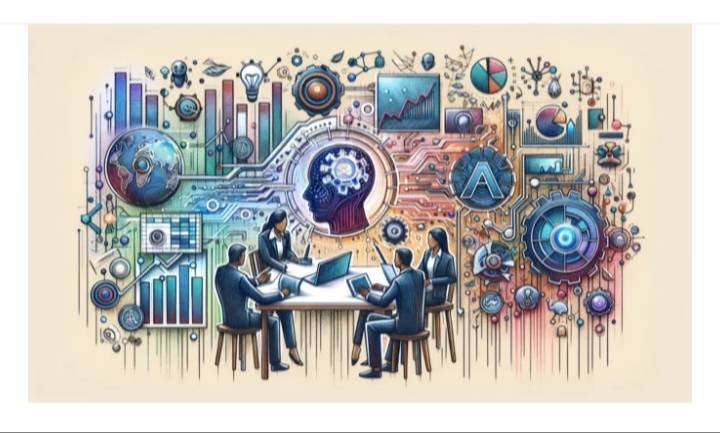
2025-02-18 01:53
इंडस्ट्रीThe economics of artificial intelligence
#firstdealofthenewyearastylz
The economics of artificial intelligence (AI) is a rapidly evolving field that explores the impact of AI on economic growth, productivity, and employment.
*Key Economic Benefits of AI:*
1. *Increased Productivity*: AI can automate routine and repetitive tasks, freeing up human workers to focus on higher-value tasks that require creativity, problem-solving, and innovation.
2. *Improved Efficiency*: AI can optimize business processes, reduce waste, and improve decision-making, leading to cost savings and increased competitiveness.
3. *Enhanced Innovation*: AI can enable new products, services, and business models, driving innovation and economic growth.
4. *Job Creation*: While AI may automate some jobs, it may also create new job opportunities in fields like AI development, deployment, and maintenance.
*Key Economic Challenges of AI:*
1. *Job Displacement*: AI may displace certain jobs, particularly those that involve routine or repetitive tasks.
2. *Inequality*: The benefits of AI may accrue to a small group of highly skilled workers, exacerbating income inequality.
3. *Bias and Fairness*: AI systems can perpetuate existing biases and discriminate against certain groups, raising concerns about fairness and equity.
4. *Regulatory Challenges*: The rapid development and deployment of AI raise regulatory challenges, particularly in areas like data protection, privacy, and accountability.
*Economic Sectors Most Impacted by AI:*
1. *Manufacturing*: AI can optimize production processes, improve product quality, and reduce waste.
2. *Healthcare*: AI can improve diagnosis, treatment, and patient outcomes, while also reducing healthcare costs.
3. *Transportation*: AI can enable autonomous vehicles, improve traffic management, and reduce transportation costs.
4. *Finance*: AI can improve risk management, credit scoring, and portfolio optimization, while also reducing financial transaction costs.
*Policy Recommendations:*
1. *Invest in Education and Training*: Governments should invest in education and training programs that help workers develop the skills needed to work with AI.
2. *Encourage Innovation*: Governments should encourage innovation by providing funding for AI research and development, and by creating tax incentives for AI startups.
3. *Address Job Displacement*: Governments should implement policies to address job displacement, such as universal basic income, retraining programs, and social safety nets.
4. *Establish Regulatory Frameworks*: Governments should establish regulatory frameworks that ensure AI systems are transparent, explainable, and fair.
लाइक करें 0
Nicky bella
Trader
गर्म सामग्री
इंडस्ट्री
विदेशी मुद्रा कहानी Forex story
इंडस्ट्री
User Survey Questionnaire
इंडस्ट्री
User Survey Questionnaire
इंडस्ट्री
User Survey Questionnaire
इंडस्ट्री
User Survey Questionnaire
इंडस्ट्री
Participate in the survey and claim your contribution rewards!
फोरम केटेगरी

प्लेटफॉर्म

एक्सहिबिशन

एजेंट

भर्ती करना

EA

इंडस्ट्री

मार्केट

इंडेक्स
The economics of artificial intelligence
 हाँग काँग | 2025-02-18 01:53
हाँग काँग | 2025-02-18 01:53#firstdealofthenewyearastylz
The economics of artificial intelligence (AI) is a rapidly evolving field that explores the impact of AI on economic growth, productivity, and employment.
*Key Economic Benefits of AI:*
1. *Increased Productivity*: AI can automate routine and repetitive tasks, freeing up human workers to focus on higher-value tasks that require creativity, problem-solving, and innovation.
2. *Improved Efficiency*: AI can optimize business processes, reduce waste, and improve decision-making, leading to cost savings and increased competitiveness.
3. *Enhanced Innovation*: AI can enable new products, services, and business models, driving innovation and economic growth.
4. *Job Creation*: While AI may automate some jobs, it may also create new job opportunities in fields like AI development, deployment, and maintenance.
*Key Economic Challenges of AI:*
1. *Job Displacement*: AI may displace certain jobs, particularly those that involve routine or repetitive tasks.
2. *Inequality*: The benefits of AI may accrue to a small group of highly skilled workers, exacerbating income inequality.
3. *Bias and Fairness*: AI systems can perpetuate existing biases and discriminate against certain groups, raising concerns about fairness and equity.
4. *Regulatory Challenges*: The rapid development and deployment of AI raise regulatory challenges, particularly in areas like data protection, privacy, and accountability.
*Economic Sectors Most Impacted by AI:*
1. *Manufacturing*: AI can optimize production processes, improve product quality, and reduce waste.
2. *Healthcare*: AI can improve diagnosis, treatment, and patient outcomes, while also reducing healthcare costs.
3. *Transportation*: AI can enable autonomous vehicles, improve traffic management, and reduce transportation costs.
4. *Finance*: AI can improve risk management, credit scoring, and portfolio optimization, while also reducing financial transaction costs.
*Policy Recommendations:*
1. *Invest in Education and Training*: Governments should invest in education and training programs that help workers develop the skills needed to work with AI.
2. *Encourage Innovation*: Governments should encourage innovation by providing funding for AI research and development, and by creating tax incentives for AI startups.
3. *Address Job Displacement*: Governments should implement policies to address job displacement, such as universal basic income, retraining programs, and social safety nets.
4. *Establish Regulatory Frameworks*: Governments should establish regulatory frameworks that ensure AI systems are transparent, explainable, and fair.
लाइक करें 0
मैं भी टिप्पणियाँ करना चाहता हूँ
प्रस्तुत
0टिप्पणियाँ

अभी तक कोई टिप्पणी नहीं है। पहले एक बनाओ।

प्रस्तुत
अभी तक कोई टिप्पणी नहीं है। पहले एक बनाओ।